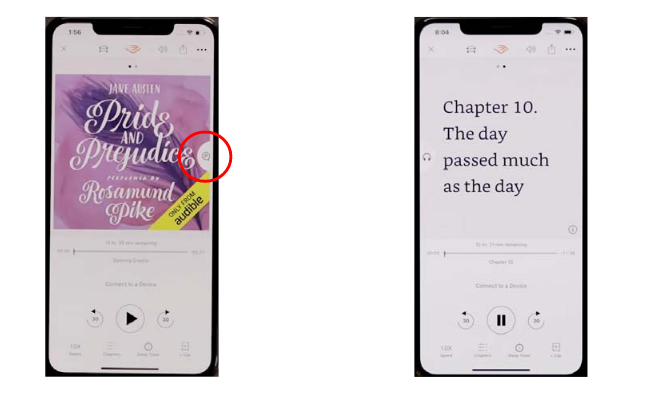
The following post by Authors Alliance Copyright Research Assistant Nicolas Charest provides an update on recent developments in the Chronicle Books v. Audible case, currently in the Southern District of New York. We encourage members of Authors Alliance to contact us at info@authorsalliance.org to share your views on the proposed Audible Captions feature.
Update (Jan. 2020): After the publication of this post, the parties announced that they have settled the dispute.
Earlier this summer, Audible announced plans to enable machine-generated text captions to scroll across screens as audiobooks are played, a development that prompted a group of seven publishers—including HarperCollins, Penguin Random House, Hachette Book Group, Simon & Schuster, and Macmillan—to initiate a lawsuit against Audible. As our previous discussion of the litigation explained, the publishers maintain that the Captions feature would infringe their copyrights because it creates unauthorized derivative works and reproduces, distributes, and publicly displays unauthorized copies of the books.

In its recent filing, Audible argues that the publisher’s case should be dismissed because the licenses granted to Audible bar such a claim, and that in any event, the Captions technology is a fair use of the copyrighted works. This post focuses on the fair use arguments; a detailed account of the license issue can be found here (and in the related court filing, here).
A refresher on fair use may be useful to readers: Fair use is a limitation on U.S. copyright law which allows authors to use portions of a copyrighted work without permission or payment, so long as that use is “fair.” Courts consider at least four factors when determining whether a use is fair: 1) the purpose and character of the challenged use (often asking if the use is “transformative”), 2) the nature of the copyrighted work, 3) the amount and substantiality of the copyrighted work used, and 4) the effect on the potential market for the copyrighted work. These four factors do not work in isolation and must be carefully weighed together to determine if a use is fair.
Audible’s Fair Use Argument
Audible argues that Captions is a quintessential fair use. Audible argues that under the first fair use factor, Captions is unequivocally “transformative” and is a “utility-expanding” use of the licensed audiobooks: After paying for the right to experience the audiobook, listeners can use Captions to verify and focus on what they are hearing and to access external resources such as dictionaries or translations. Instead of allowing a user to read a book in any meaningful sense, Audible maintains that the purpose of Captions is to improve a listener’s ability to understand the work she has purchased.
Under the third fair use factor, Audible argues that the amount of the copyrighted work used to generate Captions is reasonable in relation to the purpose of the copying. Under the fourth factor, Audible argues that the Captions feature is unlikely to dissuade a user from purchasing the full text of the books, since the captions are not a substitute and do not provide a replacement for a book or e-book. Audible claims that the brief display of words does not provide a meaningful substitute for the actual book because the text of the original work is transcribed in small portions, it is displayed only momentarily and in sync with the audio, and it does not provide the ability to refer back or flip through a full coherent text. (As for the second fair use factor, Audible argues that the fair use case hinges on the other three factors.)
Taking the four factors together, Audible argues that Captions is a fair use of the licensed audiobooks.
Publishers’ Reply to the Fair Use Argument
In reply to Audible’s fair use arguments, the publishers argue that the Captions feature is not transformative and gives access to the entirety of the text, which is not fair use. Under the first fair use factor, the publishers argue that Captions is not transformative as it does not serve another and different purpose than what would be accomplished by the underlying text: both serve the purpose of reading. The publishers argue that the Captions feature “does not shed any new light on the text of Publishers’ Works, it does not comment on or criticize them, and it is not used to find an authorized version of them; it merely provides the Works’ text in competition with authorized offerings.”
Under the second factor, the publishers argue that most of the copyrighted works at issue are creative and fictional, weighing against a finding of fair use. Under the third factor, the publishers argue that the Captions feature provides access to the entirety of the work, also weighing against fair use. Here, publishers distinguish Captions from the Google Books snippets fair use case. Where Google Books only provides snippets of books to allow a user to assess whether access to the entire book would be useful, at no point do these snippets display more than 1/8 of a page around a searched keywords and 10% of each book is permanently unavailable. In contrast, Captions has no such restrictions and the feature would allow access to 100% of the underlying text.
Finally, under the fourth factor, publishers argue that Captions would cannibalize market opportunities for publishers to distribute or license the eBooks of its texts, thus weighing against a finding of fair use. The publishers maintain that Captions is likely to discourage users to purchase the print and ebook versions of the underlying text, and that Captions directly competes with parallel markets for the texts, including cross-format services like Audible’s own Immersive Reading services.
In sum, the publishers argue that the balance of the factors weighs against Audible’s fair use claim.
Going Forward
The parties are currently waiting on a decision on whether a preliminary injunction will be granted, which would prevent Audible from launching Captions on all of the publishers catalog pending trial. Meanwhile, Audible is delaying the complete rollout of Audible Captions, making it available only for audiobooks in the public domain until the litigation is resolved. We will continue to monitor and provide updates on the litigation.
Discover more from Authors Alliance
Subscribe to get the latest posts sent to your email.
